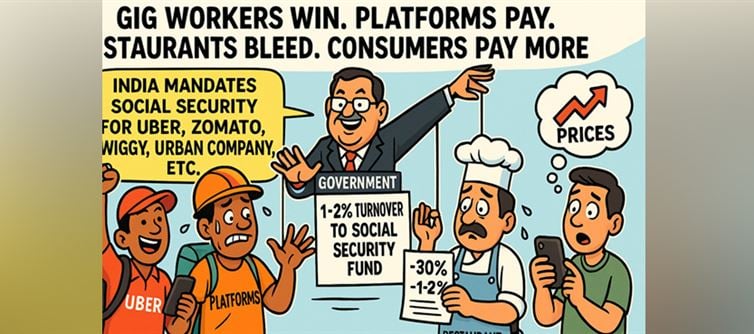
Today, india flipped the switch on one of the most ambitious labour reforms in its history — the four Labour Codes. On paper, it’s a long-awaited win: gig workers finally get social security, a first for any major economy at this scale.
But in the real world — the world of margins, prices, layoffs, taxes, restaurants collapsing under platform commissions, IT workers losing jobs with zero safety nets — the picture is far messier.
The question is no longer “Is social security good?”
The question is:
“At what economic cost — and who pays the bill?”
1. india Just Made history — Gig workers Finally Get Social Security
For the first time ever:
✔ health cover
✔ accident insurance
✔ disability & maternity benefits
✔ old-age protection
✔ a dedicated Social Security Fund
This is massive.
Unprecedented.
Long overdue.
India is now among the first big economies to do this nationally.
2. Platforms Must Pay 1–2% of Turnover Into a Welfare Fund
Sounds small — until you realise turnover ≠ profit.
Zomato, swiggy, Uber, and Dunzo operate on razor-thin margins.
A forced levy might:
– raise prices
– shrink commissions
– accelerate layoffs
– push platforms into survival mode
Great policy. Questionable execution.
3. Your zomato Order Will Get Costlier — Because Someone Has to Pay
zomato & swiggy already take 30–40% commissions from restaurants.
Now add another 1–2% levy, PLUS GST, PLUS higher operational costs.
Result?
🔺 Food prices = up
🔻 Restaurant profits = down
🔻 Order frequency = down
🔻 Restaurant survival = at risk
Consumers will quietly shift to:
✔ direct ordering
✔ quick commerce
✔ buying from markets
✔ eating at home
Platforms may get regulated into irrelevance.
4. IT workers — The Backbone of India’s Tax Revenue — Still Have zero Safety Net
While gig workers celebrate, millions of salaried workers ask:
“Where is OUR social security?”
IT layoffs are hitting record highs.
People who paid lakhs in taxes get:
– no severance protection
– no unemployment benefits
– no pension
– no tax-free compensation
This Labour Code pretends they don’t exist.
5. Social Security Is Not a Free Lunch — Someone Must Pay
And right now, the cost is being forcibly extracted from:
– platforms
– restaurants
– consumers
– workers (through lower payouts)
– taxpayers indirectly
A welfare system should be:
✔ universal
✔ simple
✔ funded via a small consumption tax
not
❌ platform-by-platform Frankenstein compliance.
This is a policy built for paperwork, not productivity.
6. government Overreach or Worker Protection? Depends Who You Ask
Yes, gig workers need safety nets.
Yes, platforms often exploit them.
But when the government dictates micro-allocations of corporate money, you risk:
– killing innovation
– scaring investors
– slowing job creation
– shrinking the gig economy itself
You protect workers… but kill the companies that employ them.
7. Restaurants Are the Biggest Victims (But No One Talks About Them)
Restaurants lose 30–40% per order to aggregators.
Margins are thin.
Rent is high.
Staff costs are rising.
Food inflation is brutal.
Now add gig-worker levies → many small restaurants simply won’t survive the next 12 months.
8. india Needed Simple, Smart Welfare — Not a Compliance Tsunami
A tiny cess on consumption could have funded:
✔ universal gig security
✔ unemployment insurance
✔ pensions
✔ severance protection
Instead, we have a complicated, platform-specific, bureaucratic maze that risks strangling the ecosystem it claims to protect.
9. The government Must Decide —
Do You Want Innovation, or Do You Want Control?
When the state starts dictating what companies do with revenue…
…you're no longer enabling the economy.
You're micromanaging it.
And history shows: micromanaged economies don’t grow — they suffocate.
⚔️ FINAL WORD
The new Labour Codes are a mixed legacy:
🌟 a historic win for gig workers
💣 a potential disaster for startups
🔥 a new burden on restaurants
🩹 zero safety net for middle-class taxpayers
⚠️ a compliance bomb waiting to explode
india is trying to build a welfare state — but without the economic engine needed to sustain one.
Unless policy is simplified, balanced, and matched with real job creation… this reform may end up protecting workers by destroying the work itself.




 click and follow Indiaherald WhatsApp channel
click and follow Indiaherald WhatsApp channel